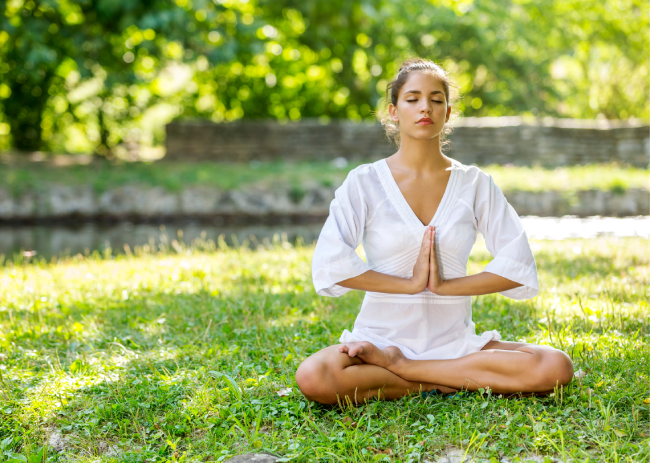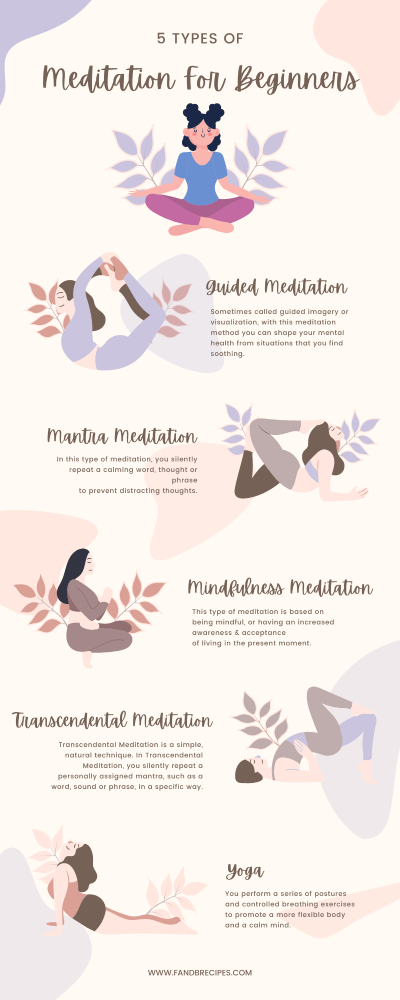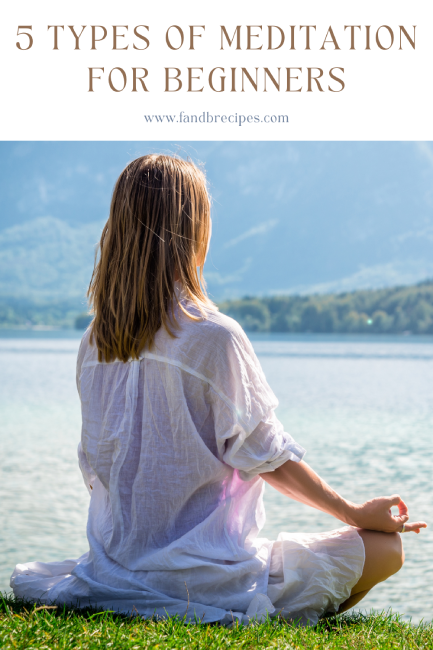5 Types of Meditation For Beginners
How many times have you heard someone say “Try meditation?” The word meditation is often used by people whenever someone is anxious. That’s the power of it! The word has old French and Latin origins. It means “to think” or “contemplate”. However, don’t we do that every day? Aren’t we as humans constantly thinking about something? What makes meditation different? Be it meditation for beginners or masters, everyone focuses on one thing.
A lot of cultures practice meditation. However, people often link meditation with religion. As much as you can use meditation for religious practices, you can also independently practice it.
Meditation is very much like therapy. It is the number of ways one can concentrate and become more aware. You can meditate anywhere at any time whatsoever. Therefore, meditation is all about being alone with your mind. Doing so helps you become more aware of your thoughts and feelings.
When we think of meditation, we imagine silence. We often think of a person sitting cross-legged without any thoughts. However, meditation allows your thoughts to pass in and out.
For instance, imagine walking past a beggar. Doing so might make you think: “should I give him some money or walk away?” However, if this thought came to you while meditating, you would not be chasing that thought. People who actually know how to meditate can do so even at a noisy party. It is all about letting your thoughts loose and free.
Life is difficult, no doubt. Why do you want to sit and think over the past and future? You’ve got to learn how to let things go and connect with your present better. Meditation is a self-care practice that can help you do so.
The Benefits of Meditation for Beginners
You cannot control certain things that take place in life. However, you can change the way you connect with these instances. All you need is a little more compassion and awareness. Meditation for beginners is just a slow process of feeling calm and content with life. Here are some benefits of meditation:
- Reduces Stress and Anxiety: Stress is among the main reasons people start meditation. In fact, research shows people felt improvement in stress-related symptoms after meditation. Meditation can also help reduce your anxiety levels.
- Gives Clarity and Stability: Meditation helps you get a clearer picture of life. In addition, it helps you feel positive about things around you. Therefore, helping you achieve emotional stability.
- Focus and Sharpness: Meditation helps you build focus and can expand your consciousness. This balance has the power to improve yourself as well as your creativity.
- Addiction: Medicine can help build your mind’s discipline. This self-awareness and control can actually help you fight addictions. People do often get into bad habits due to underlying stress. However, this can be managed through meditation.
- Lower Blood pressure: Regular meditation also has the power to lower high blood pressure levels. It reduces strain on your arteries and heart. Therefore, it can be really helpful for heart patients.
- Improves Energy: Meditation helps increase your body’s energy levels. In addition, it also helps improve your immune system. You will start seeing a change in your mood and internal energy after a few weeks of regular meditation.
- Personal transformation: If there is one beautiful advantage of meditation, it is this. People who meditate have a beautiful aura about themselves. They tend to be happier. They start knowing themselves a lot better than before. Therefore, you start loving yourself a little more.
5 Types of Meditation For Beginners
People use different ways to achieve that level of mindfulness. Here are a few ways of meditation for beginners:
- Guided Meditation: As the name suggests, this type of meditation is usually guided. This might be a teacher or a practitioner. However, this type of meditation requires a lot of involvement from your senses too. Through this form of meditation, you mentally go into an imagery place. For instance, you always feel peaceful sitting in a park. So, a guide could help you visualise you being in a park.
- Mantra Meditation: It is when you keep repeating a certain word or phrase during meditation. This is also called chanting. For instance, a lot of us have heard about the famous “Om chanting technique.” This is mantra meditation. You may repeat it in your mind or whisper it. It doesn’t matter. Some people also repeat positive phrases like “I am happy.”
- Mindfulness Meditation: This form of meditation is more like a mental exercise. It helps you slow your thoughts. In addition, It helps you grow into living and accepting your present. You may pay attention to your breath only. If not, you may act as an observer to your thoughts. However, you must let them come and go.
- Transcendental Meditation: This meditation also uses mantras or phrase repetition. However, they don’t just use any mantra. They use a specialised mantra or sound that leads you into a trance.
- Yoga: Yoga has become a popular part of daily lifestyle today. From celebrities to leaders, everyone has this included in their schedule. Yoga is your set of several postures and breathing exercises. They help improve your flexibility as well as body balance. They also have a huge impact on your mind. Therefore, yoga can help you become more peaceful and calm.
FAQs:
Which Meditation Is Recommended For The Beginners?
Well, meditation can be both simple and complicated. However, everyone has a different way of calming themselves. Therefore it is a personal choice. The goal of different types of meditation is ultimately the same. It is to bring you peace and calmness. You can choose from all the above-mentioned meditations for beginners. If you want something to start with, you can go for simple breathing meditation. You have to take deep breaths and focus on your breathing. This form of meditation is simple and easy for beginners.
How Long Should You Meditate When You First Start?
When you begin anything, you should start slowly. However, being slow here doesn’t mean a longer period of time. In fact, meditation for beginners looking for stress relief should be for around 10 minutes only. Some people prefer doing it for a little longer too. So, in case you want to work more on your focus and self, you can meditate longer. In the case of meditation, the time duration is not the issue. It is consistency that matters.
Can You Teach Yourself To Meditate?
Most of us have nine to five jobs and are busy the entire day. It becomes tough to go for meditation classes or arrange a teacher. Therefore, some people prefer learning meditation in the comfort of their homes. You can totally do so. You can practise basic meditation all by yourself. Your focus must be to ensure avoiding any disturbances or distractions. Nowadays, apps such as Headspace also help you learn by yourself. Some apps also provide you with meditative music.
What Are The 5 Stages Of Meditation?
The five stages of meditation are: gross, subtle, bliss, focus on the I and objectless attention. Firstly, you began with an object of attention: this is your gross stage. Secondly, your ambience: nature and your senses form the subtle stage. Thirdly, it is when you become aware of happiness underneath it all. Fourthly, it is when you realise that you are actually working on your individuality. Finally, you achieve just stillness. Until, the fourth stage, you were focusing on something but in the final stage, you are left empty-minded.
What Time Of Day Should I Meditate?
Well, there is no rule. This is a major benefit of meditation. It can be practised anytime and anywhere. Therefore, the time you choose is totally at your convenience. Although, early mornings, and before sunrise is ideal. However, some people like meditation after a tiring day at work. Some prefer to meditate while feeling anxious. Some also meditate at the end of the day before sleeping. People find it great to unwind and feel calm before bed. However, this is not considered ideal. You don’t want to meditate in order to sleep. Therefore, it is best to have at least a one-hour gap between both.
In Conclusion
Meditation for beginners is not obstacle-free. There might be a lot of small problems that you face. You may find it tough focusing or you may fall asleep. Sometimes, people even get diverted and their minds wander. However, it’s okay for these things to happen.
You shouldn’t be under pressure of getting things right. You should just remember a few things such as your purpose of meditation. It is important that we all learn to take some time out for ourselves.
Therefore, set some time aside and try to be regular. Self-care and self-love are consistent processes. Meditation is a beautiful practice to add to your daily lifestyle.
Which types of meditation have you tried? Where do you meditate? Let us know in the comments section below!
This infographic visually explores the different types of meditation for beginners.
Paridhi Maheshwari is a content writer at F and B Recipes and Snazzy Women. She’s an aspiring journalist aiming to cover human interest stories through the power of her words.





